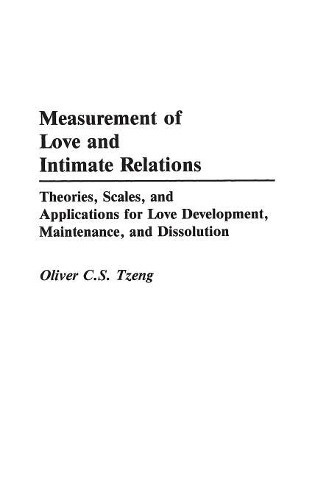
Measurement of Love and Intimate Relations: Theories, Scales, and Applications for Love Development, Maintenance, and Dissolution
(Hardback)
Publishing Details
Measurement of Love and Intimate Relations: Theories, Scales, and Applications for Love Development, Maintenance, and Dissolution
By (Author) Oliver C. S. Tzeng
Bloomsbury Publishing PLC
Praeger Publishers Inc
30th August 1993
United States
Classifications
Tertiary Education
Non Fiction
Gender studies, gender groups
Cognition and cognitive psychology
Behaviourism, Behavioural theory
Psychology: sexual behaviour
Cultural studies
306.7
Physical Properties
Hardback
328
Width 156mm, Height 235mm
680g
Description
Reading this book will help answer the questions: What is love Who will fall in love and who will not Why will some love relationships endure and not others How can one evaluate and improve a love relationship Why does one love relationship dissolve more easily than another How should one handle love dissolution problems This is the most comprehensive and state-of-the-art work on the measurement of love. It includes descriptions of a theoretical paradigm and two love models, a common mythological framework for theory development and evaluation, an introduction to over 40 theories for love development, maintenance, and dissolution, the integration of research principles and strategies, the compilation of 26 popularly used scales, and illustrations of three empirical research programs in measuring love and intimate relations. The compilation of scales provides information on purpose, function, constructs, psychometric properties, subject response formats, and actual measurement items. This book complements Tzeng's most recent work, Theories of Love Development, Maintenance, and Dissolution.
Author Bio
OLIVER C. S. TZENG is Director of the Osgood Laboratory for Cross-Cultural Research at Indiana University-Purdue University at Indianapolis. He is also professor of psychology, director of the Graduate Applied Social Psychology program, and director of the Multidisciplinary Graduate Training Program on Child Abuse and Neglect. He is the author of Theories of Love Development, Maintenance, and Dissolution (Praeger, 1992), and co-author of Theories of Child Abuse and Neglect (Praeger, 1991), and co-editor of Language, Meaning, and Culture (Praeger, 1990).
